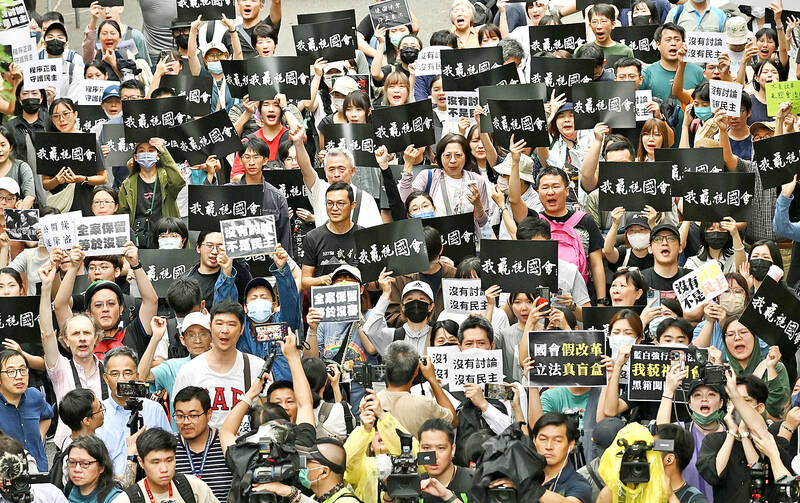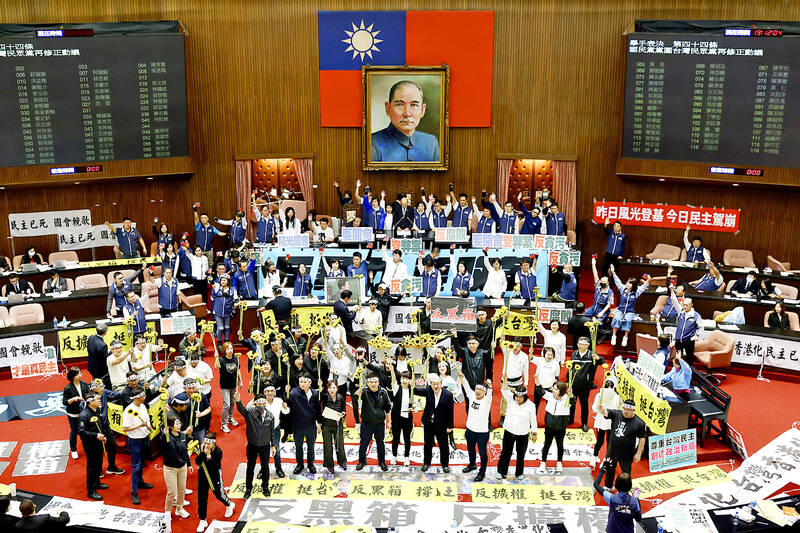Thousands of people yesterday gathered outside the Legislative Yuan calling for more transparency regarding legislative reform bills and demanding that proceedings that devolved into brawls on Friday last week be declared null and void.
The demonstrators included members of civic groups and political parties such as the Taiwan Statebuilding Party, the New Power Party and the Green Party Taiwan. They decried what they called procedural issues concerning bills proposed by the Chinese Nationalist Party (KMT) and the Taiwan People’s Party (TPP), adding that the bills should undergo committee reviews in line with standard legislative procedure.
The protesters said the opposition parties were resorting to undemocratic behavior to push through bills that would introduce “contempt of legislature” charges, require the president to answer lawmakers’ questions and expand the legislature’s investigative powers.

Photo: Lo Pei-de, Taipei Times
The bills should be sent back to the legislature’s Judiciary and Organic Laws and Statutes Committee for a substantive review, while last week’s proceedings should be declared invalid, they said.
The bills did not undergo a line-by-line review in the committee. Instead all versions proposed by KMT legislators and the TPP caucus were sent directly to the legislative floor, where on Friday last week, the two parties presented a series of revisions that were not available for review on the legislature’s Web site.
Democratic Progressive Party (DPP) legislators said the process lacked transparency, while the opposition said that printouts of the revisions were placed on their desks at the time of the proceedings.

Photo: Ritchie B. Tongo, EPA-EFE
Meanwhile, in the legislative chamber yesterday, opposition lawmakers used their majority to pass a second reading of parts of the reform bills that would allow legislators to fine government officials up to NT$200,000 for “contempt of the legislature” for contraventions during interpellation sessions.
The KMT holds 52 seats in the 113-seat legislature, the TPP has eight and the DPP has 51, while two independent legislators are ideologically aligned with the KMT.
The draft amendments to Article 25 of the Act Governing the Legislative Yuan’s Power (立法院職權行使法) added the clause that officials cannot respond to legislators’ queries with a question.
The draft says the person being questioned must not refuse to answer, refuse to provide or hide information, or answer falsely, or commit other acts that could be considered “contempt of the legislature,” unless the information pertains to national defense, would cause obvious and immediate damage to diplomatic relations, or should be kept secret under other laws or items that the speaker has agreed to.
The person being questioned cannot recuse themselves from the interpellation unless the legislator or legislative committee agrees to their request, it says.
The third paragraph of the article was amended to state that if the person being questioned contravenes any of the requirements, they should be stopped, ordered to appear or ordered to answer to the legislative speaker. The speaker or legislator asking the questions can make a motion — which must receive the signatures or approval of five other legislators in the session — to have the person fined NT$20,000 to NT$200,000 for failing to comply. Fines can be applied for each offense.
Government officials who make false statements should be criminally indicted, it says.
The DPP caucus said that Legislative Speaker Han Kuo-yu (韓國瑜) did not check the number of legislators present each time before a vote was taken.
DPP legislators wore headbands reading: “Democracy is dead,” while DPP caucus whip Ker Chien-ming (柯建銘) said that the KMT and TPP legislators were “sellouts and traitors to Taiwan.”
Responding to criticisms that he broke protocol by not allowing the legislature to review the amendments item by item, Han said he had suggested such a review during cross-caucus negotiations last week, adding that each party caucus has one representative who can ask questions, but the DPP caucus refused.
Commenting on the protesters outside the legislature, TPP caucus whip Huang Kuo-chang (黃國昌) said that Taiwan is a free and democratic society, and he respects everyone who has different opinions.
However, he said that all discussions should be based on fact, urging the DPP to stop spreading false information.
Additional reporting by Lee Wen-hsin

A magnitude 5.6 earthquake struck off the coast of Yilan County at 12:37pm today, with clear shaking felt across much of northern Taiwan. There were no immediate reports of damage. The epicenter of the quake was 16.9km east-southeast of Yilan County Hall offshore at a depth of 66.8km, Central Weather Administration (CWA) data showed. The maximum intensity registered at a 4 in Yilan County’s Nanao Township (南澳) on Taiwan’s seven-tier scale. Other parts of Yilan, as well as certain areas of Hualien County, Taipei, New Taipei City, Taoyuan, Hsinchu County, Taichung and Miaoli County, recorded intensities of 3. Residents of Yilan County and Taipei received

Taiwan has secured another breakthrough in fruit exports, with jujubes, dragon fruit and lychees approved for shipment to the EU, the Ministry of Agriculture said yesterday. The Animal and Plant Health Inspection Agency on Thursday received formal notification of the approval from the EU, the ministry said, adding that the decision was expected to expand Taiwanese fruit producers’ access to high-end European markets. Taiwan exported 126 tonnes of lychees last year, valued at US$1.48 million, with Japan accounting for 102 tonnes. Other export destinations included New Zealand, Hong Kong, the US and Australia, ministry data showed. Jujube exports totaled 103 tonnes, valued at

BIG SPENDERS: Foreign investors bought the most Taiwan equities since 2005, signaling confidence that an AI boom would continue to benefit chipmakers Taiwan Semiconductor Manufacturing Co’s (TSMC, 台積電) market capitalization swelled to US$2 trillion for the first time following a 4.25 percent rally in its American depositary receipts (ADR) overnight, putting the world’s biggest contract chipmaker sixth on the list of the world’s biggest companies by market capitalization, just behind Amazon.com Inc. The site CompaniesMarketcap.com ranked TSMC ahead of Saudi Aramco and Meta Platforms Inc. The Taiwanese company’s ADRs on Tuesday surged to US$385.75 on the New York Stock Exchange, as strong demand for artificial intelligence (AI) applications led to chip supply constraints and boost revenue growth to record-breaking levels. Each TSMC ADR represents

TRUST: The KMT said it respected the US’ timing and considerations, and hoped it would continue to honor its commitments to helping Taiwan bolster its defenses and deterrence US President Donald Trump is delaying a multibillion-dollar arms sale to Taiwan to ensure his visit to Beijing is successful, a New York Times report said. The weapons sales package has stalled in the US Department of State, the report said, citing US officials it did not identify. The White House has told agencies not to push forward ahead of Trump’s meeting with Chinese President Xi Jinping (習近平), it said. The two last month held a phone call to discuss trade and geopolitical flashpoints ahead of the summit. Xi raised the Taiwan issue and urged the US to handle arms sales to